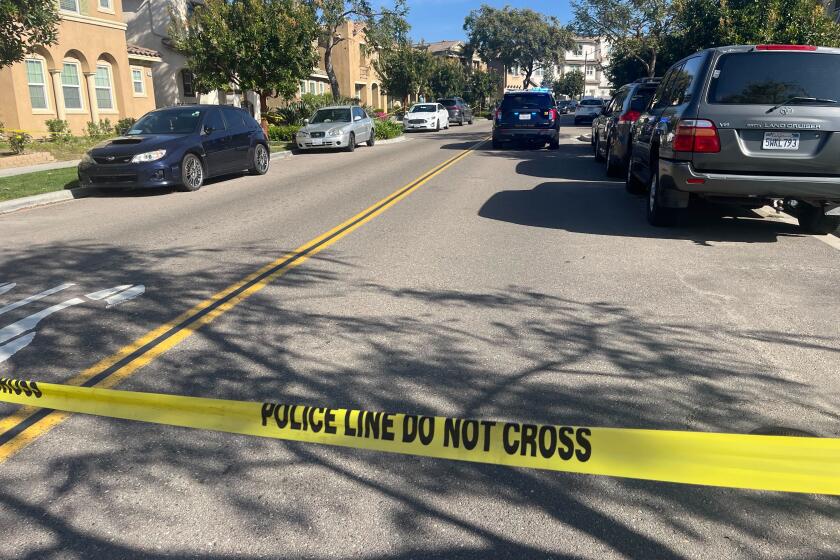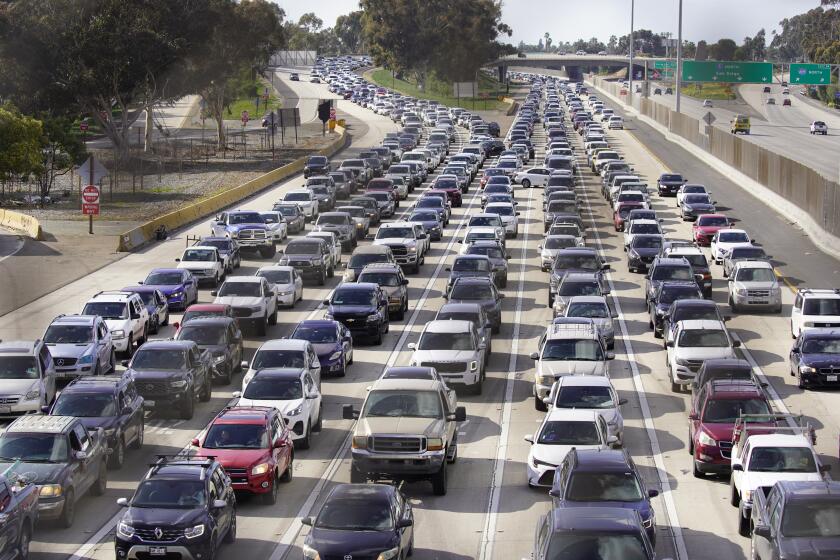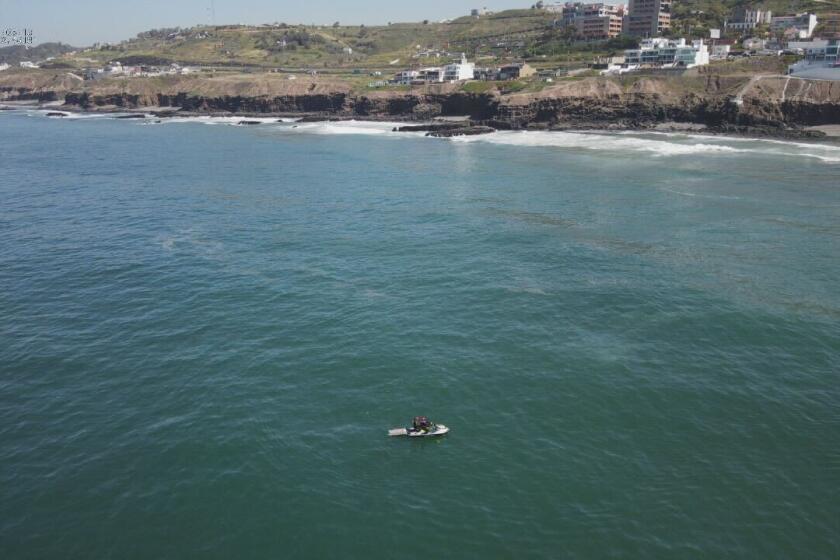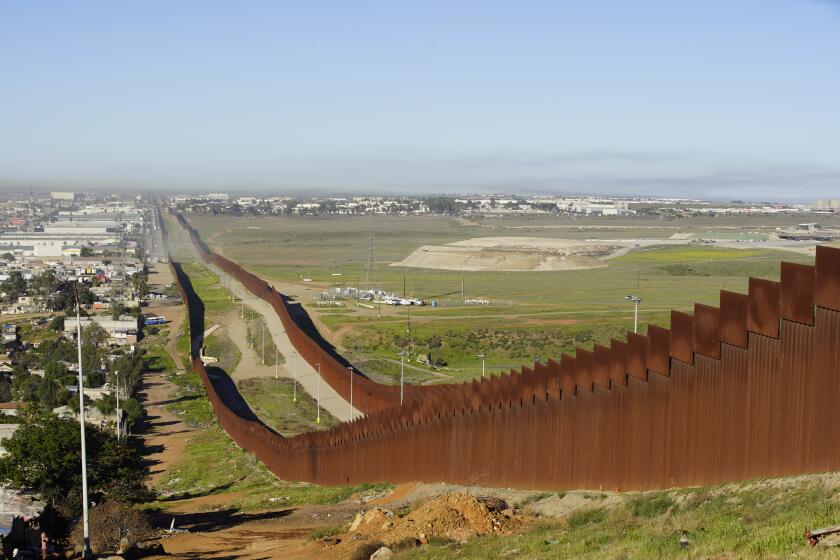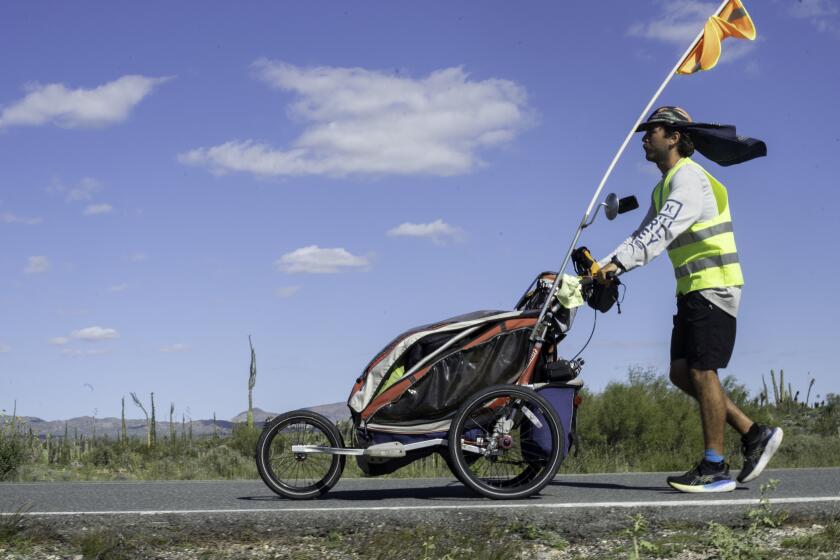Fleeing ISIS, Chaldeans travel ‘underground railroad’ to El Cajon
Last summer, as ISIS fighters swept toward his home in northern Iraq, slaughtering “infidels” and demolishing their communities, Fadi Hirmiz grew frantic.
“ISIS was getting closer and closer to our village,” Hirmiz said through an interpreter. “I was afraid for my family, for our kids.”
A 38-year-old Chaldean Catholic, Hirmiz was trapped in the sectarian crossfire ravaging Iraq. The Shia Muslims leading Baghdad’s central government and army seemed deaf to his pleas. And this Christian knew the Sunni-led ISIS, also known as the Islamic State, would be worse, demanding that he, his wife and two children convert to Islam or die under the sword.

While these refugees have found a safe haven in El Cajon, the friends or relatives they left behind in Iraq now face what one man calls “a Christian genocide.”
Poor and illiterate, Hirmiz could think of only one place to turn: El Cajon.
“My wife’s cousin is a friend of Mark Arabo,” Hirmiz said, citing a prominent East County Chaldean. “That’s how we got help.”
Today in El Cajon’s 60,000-plus Chaldean population — after Detroit, the second largest concentration in the United States — there’s a palpable sense of panic. While these refugees have found a safe haven here, the friends or relatives they left behind in Iraq now face what one man calls “a Christian genocide.”
That man is Mark Arabo, president and CEO of the Neighborhood Market Association, which represents dozens of independent retail stores, most of them owned by ethnic Chaldeans.
Born and raised in East County, Arabo is a first generation Iraqi-American. Yet this 32-year-old retains an immigrant’s stereotypical drive. Impeccably groomed and tailored, he has a Beltway politician’s polish and a true believer’s passion. He’s like a preacher whose fire and brimstone sermons can make his own congregation nervous.
He blasts Washington politicians — including those who have received his campaign donations — for their “apathetic and pathetic” response to this crisis.
“Obama is failing on this issue completely,” he said. “Our Congress is turning a blind eye to a full-blown genocide.”
Growing impatient, last year Arabo founded the Minority Humanitarian Foundation, a nonprofit that supports Chaldeans and other persecuted religious minorities — and, he said, runs an “underground railroad” that transports Iraqi refugees into San Diego.
While Arabo would not reveal details of his operation, Hirmiz said his family’s escape was engineered by the El Cajon resident. Their journey began on Aug. 15, 2014, when they boarded a truck in their northern Iraqi village, Batnaya, and rode to the Turkish frontier. There, a contact supplied them with a packet of plane tickets — from Turkey to a European hub, Europe to Mexico City, Mexico City to Tijuana.
Hirmiz and his fellow travelers fly into Mexico, Arabo said, because the U.S. demands visas of foreign travelers. His refugees lack those documents.
“This has to do with the flexibility of Mexican officials,” he said, “and the inflexibility of the American officials.”
After a night on the border, Hirmiz and his family entered the United States at San Ysidro on Sept. 1. Their request for asylum is still under review.
“We believe this country has freedom,” Hirmiz said. “We want to practice this freedom.”
Arabo insists his makeshift, freelance operation is necessary: “The underground railroad wasn’t our first choice. It was our last choice.”
Others are skeptical. Critics within the local Chaldean community note that these expensive journeys — the estimated cost for a family of four: $25,000 — rely on a shadowy network of anonymous guides.
“I would not leave people in the hands of smugglers,” said Besma Coda, chief operating officer of Chaldean & Middle-Eastern Social Services, a nonprofit based in El Cajon. “They are not good people.”
Others cite the 27 Chaldeans now in the custody of U.S. Immigration and Customs Enforcement at Otay Mesa. To date, 15 have been ordered deported and five face criminal charges for entering the U.S. under false pretenses. Several had been granted asylum in other countries. Others were using aliases, a red flag when terrorists have vowed to attack America.
“It’s just a very huge national security concern for the agency,” said Lauren Mack, a spokeswoman for ICE. “We are doing our due diligence to ensure that anyone who gets admitted to the country on any kind of visa, that we have their true identity.
“It’s too dangerous in this world.”
Similar fears, of Islamists waging jihads against unbelievers, haunt local Chaldeans. Sanaa Jibrael recently visited Arabo’s office. Speaking the Chaldean dialect, she explained that her sister’s family faces daily harassment and threats. She begged Arabo to spirit them out of Iraq.
“He told her he is working on it,” an interpreter said, “trying his best. He will not give up on her.”
Dangerous hairstyles
Chaldeans have been settling in El Cajon for decades, often one step ahead of their tormentors. Coda’s family, for instance, arrived in 1980 when her father feared retribution from Iraq’s then-ruler, Saddam Hussein.
“We left everything behind,” she said. “But at least we had passports and identification.
“This is the hardest time for the Middle East, the hardest time for Iraq.”
Federal statistics support that claim. In 2004, the year after American forces had ousted Hussein, only 66 would-be Iraqi refugees arrived in the U.S. By 2013, with the Islamic State group on the rise, the number had grown to 19,487.
Martin Shamasha, who took his wife and three children out of Iraq in 2012, said life in their homeland had become unbearable. Running his village’s liquor store, he received death threats from militant Islamists.
“I used to think about what they were going to do to my wife and children,” he said through a translator. “My only option was to leave.”
In interviews with local Chaldeans, a persistent theme is the lawlessness of Iraqi society. Even before the Islamic State’s 2014 campaign in northern Iraq and Syria, al-Qaeda sympathizers and others attacked residents for perceived infractions of Sharia law.
Sanaa Jibrael’s adult son, who worked as a barber near Baghdad, feared for his life in 2010. His crime?
“He was making American hairstyles,” she recalled, “and they didn’t like that. They threatened him.”
Salam Qassyounan fought for his country in the Iran-Iraq War of 1980-1988, losing his left leg to a mine and enduring 16 years in an Iranian prison. Released in 1998, he returned to Iraq and the woman he had married 10 days before marching off to the front lines.
Meeting him at the border, his wife saw a stranger: “You are not Salam.”
She would eventually recognize and embrace her long-lost husband, and they rebuilt their lives together. Yet the veteran felt uncomfortable in his own country. Walking in Baghdad, the Chaldean heard an imam’s sermon broadcast in the streets.
“He was announcing, ‘Don’t buy anything from Christian. We will take all these things without money. Don’t live with them. Don’t respect them,’” Qassyounan recalled.
Soon after, he took refuge in Sweden. Unable to take his wife and children there, he eventually obtained a U.S. visa and followed his family to El Cajon.
“I feel I am now human,” he said. “We Christians are not humans in our country. Not just Christians — even the Yazidi.”
With the rise of the Islamic State, non-Muslims feel even more threatened. In Christian towns captured by the terrorist group, girls have been kidnapped and men executed. Last week, The New York Times reported on the systematic rape of non-Muslim women by Islamic State fighters, who tell their victims that these crimes are sanctioned by Allah.
“Women are being sold in the market for $300, $400,” said Besma Coda. “They beat them and sexually assault them. That is not something I can hear and just shut my mouth and watch.”
Still, she deplores the “underground railroad.” While praising Arabo — “I know his work and it is very much appreciated in the community” — Coda worries about immigrants who trek halfway around the world without official sanction or support.
“That’s not the right way,” she said. “The right way is to advocate for people.”
‘We lost everything’
Similar arguments are heard in Washington. Arabo flew to the capital in June 2014 and again last month, meeting with White House and State Department officials and members of Congress. He carried a thick binder stuffed with 70,000 applications. Each, he said, had proper identification and sponsors in the United States.
Each, he said, could be saved with a U.S. visa — a document now impossible to obtain in Iraq.
“Our embassies are closed, they are not processing,” Arabo said. “And the U.N. is dysfunctional on this issue.”
While Arabo received a sympathetic hearing from both Democrats and Republicans, he faces hurdles.
“There is definitely consensus that we should strive to save any person from the atrocities of ISIS and that involves attacking ISIS as much as it does supporting a range of diplomatic options,” said Joe Kasper, a spokesman for Rep. Duncan Hunter, the Republican whose district includes El Cajon. “But also it’s important that the Chaldean cause isn’t hurt as a result of a systemic pattern of falsification or certain methods of attempted entry.”
Under federal law, a foreign national already living “openly and safely” in a third country cannot be granted asylum in the U.S.
On June 25, Devid Benjamen Nooh Yako tested that law. Walking into the San Ysidro Port of Entry, he requested asylum for himself, wife and two children, saying they had been threatened by Islamists.
“You Christians are infidels,” one anonymous caller said, Yako claimed. “Wherever you go we will kill you. We will cut your heads off. We will cut your throats.”
Terrifying — if true. But Homeland Security agents say that Yako and his family had been living in Sweden since at least 2010.
A month before Yako sought asylum, Thamer Sadek Eshoa made a similar plea in San Ysidro — yet neglected to mention his true name (Tamar Sadiq Eshoa Qarandal) or current nationality (German).
And last November, Swedish citizen Manhal al Kajo tried to pass himself off as an Iraqi refugee named Manhal Hazim Korkis.
Cases like these undermine efforts to bring into the U.S. large numbers of Chaldeans. Kasper noted that Hunter understands why this group feel besieged, especially in Iraq.
“But, still,” Kasper said, “that can’t be a reason to openly urge or condone skirting the law or process.”
Arabo said the 27 Chaldeans now in custody were not passengers on his “underground railroad.” There may be some fraudulent cases, he noted, but huge numbers of worthy Chaldeans, Assyrian Catholics, Yazidis and others are in need. Last week, the International Organization for Migration calculated the number of displaced Iraqis at 3.1 million.
Evan Petrus, a former employee of the coalition forces in Iraq, qualified for a visa in 2010. Yet this Assyrian Catholic didn’t want to leave his village, Qaraqosh, until the Islamic State shelled his neighborhood last August.
He grabbed his daughter and wife, pregnant with their second child, and joined the exodus out of town. People wore vacant expressions, wept or looked terrified. He watched as two mothers brawled over a loaf of bread, each desperate to feed her children.
The journey was grueling and long — it took six weeks to reach San Diego. Today, Petrus works the night shift at an East County convenience store, going home at sunrise to his family’s tiny apartment. He misses friends and relatives, the familiar sights and sounds of home.
“Life,” he said, “is very different and very difficult.”
When he calls former neighbors, though, he hears horror stories — daughters and wives who have been kidnapped, men who have vanished, families forced to pay crushing taxes to the Islamic State.
“We lost everything,” Petrus said. “Still, I thank God. This will be a better world for my children.”
It would be an even better world, Arabo said, if Washington would devise a way to grant visas. Although the U.S. embassy in Baghdad no longer processes applications, that doesn’t have to be an insurmountable obstacle. Arabo noted that, until the recent reopening of the U.S. embassy in Havana, Cuban refugees had been processed in the U.S.
While he pledged to continue conducting the “underground railroad,” Arabo admitted that his train is too far small for this massive job.
“We are saving one here, two there, five, six there,” he said. “We need something much more robust like we did in the fall of Saigon or in Bosnia.”
Get Essential San Diego, weekday mornings
Get top headlines from the Union-Tribune in your inbox weekday mornings, including top news, local, sports, business, entertainment and opinion.
You may occasionally receive promotional content from the San Diego Union-Tribune.


